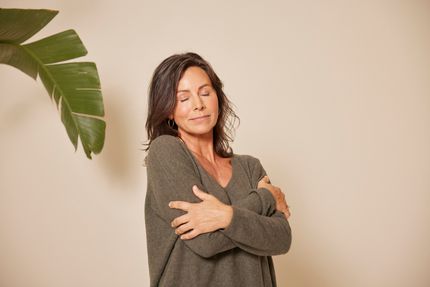Dry eyes and menopause
During menopause, your body goes through major changes. You may notice that your eyes take longer to focus or feel tired or dry. It may not be the first thing you think of, but hormone fluctuations during menopause can cause changes to your eyes.

Lately my vision has become blurry. My optician said I have dry eyes, probably due to menopause. I never knew menopause could do that. - Renate (age 54)

According to research, up to 80 percent of women with menopausal symptoms experience dry eyes or other eye problems. Women are more prone to dry eyes than men due to hormonal changes which occur throughout their lives. This explains why optometrists see more women between the ages of 40 and 50 with eye problems than men in this age group.
Eye problems and diseases are especially common in women past menopause, in postmenopause, due low oestrogen levels. What symptoms occur and when, if any at all, is different for each woman. Some women experience vision problems as early as in perimenopause, while other women’s vision remains unchanged.
What is happening in your body?
Hormones play a major role in your body. Hormones are your body's chemical messengers. They coordinate different functions by carrying messages through your blood to your organs and other tissues, including your eyes. Your eyes need tear fluid to work properly. When you blink, tear fluid is spread thinly and evenly over the surface of the eye. This is what we call tear film. It provides protection and keeps the eye smooth and moist.
The sex hormones oestrogen and progesterone influence the condition of mucous membranes in the body and thus also the production of tear film components, including tear fluid. When oestrogen levels fluctuate and drop during menopause, your eyes can become dry, sore or irritated, or you may start having eye focusing problems or blurred vision.
Oestrogen is also thought to have a stiffness‐reducing effect on the cornea, which can affect how light travels into the eye. Low oestrogen can therefore lead to blurred vision or other problems with eyesight.
Furthermore, menopause can make you more prone to developing chronic inflammation of the eyelids (blepharitis) and eye eczema due to the hormonal changes that occur during this phase. This is because oestrogen increases the production of collagen, which helps keep the skin firm and hydrated. The less collagen you have, the less hydrated your skin, resulting in thin, sensitive skin around the eyes. Your eyes or eyelids may also become red, sore, teary, sticky or more sensitive to light.
Other causes
There are also other things, besides menopause, that can cause eye problems. As we age, our vision naturally declines. Medication, allergies and skin diseases (such as eczema) and the use of contact lenses can also affect your eyes and vision. Thyroid disorders, such as Graves’ disease, can cause eye-related symptoms, including blurred vision, dryness, excessive tearing, redness, soreness or double vision.
What eye problems to look out for
- Dry eye surface
- Burning or stinging eyes
- Red eyes
- Blurred vision
- Eye discharge
- Excessive tearing (due to dryness or irritation), which can make eyes even drier.
Falling oestrogen can dry out mucous membranes throughout the body, also in the mouth, nose, throat, lungs and vagina. More about vaginal dryness.
What can you do?
- Use artificial tears or eye drops. Lubricating eye drops, also called artificial tears, provide moisture and temporary relief for dry eyes. If you notice your vision is getting worse, see an optometrist for an eye examination.
- Make healthy and varied food choices. Research has shown that foods rich in zeaxanthin, lutein, omega-3 fatty acids, Vitamins C, zinc and Vitamin E help protect your vision. Support your body by eating fruits, green leafy vegetables, broccoli, sweet potatoes, nuts and seeds.
- Drink plenty of water. Drink water and herb tea to keep your body hydrated. You also want to limit your alcohol consumption. Alcohol is a diuretic and causes the body to lose fluids.
- Get enough omega-3. Although further research needs to be done, there is already evidence that consuming the right ratio of omega-3 and omega-6 fatty acids benefits eye health. Watch your intake of omega-6 fats. If omega-6s (from vegetables oils) are ingested in high quantities, the cells lose flexibility which can affect the way they work. Supplement your diet with omega-3 fats. Omega-3 is found in foods such as nuts, flaxseed and oily fish. If you're not getting enough omega-3s in your diet, you may want to take an omega-3 supplement.
- Avoid dry air. Make sure that there is always enough fresh air in your home or use a humidifier to reduce atmospheric dryness. Avoid air currents, such as those caused by fans and hair dryers. Air conditioning and heating can also cause dry air in your home. Dry wind can aggravate dry eyes, too. Wear sunglasses with UV protection to protect your eyes.
- Stop smoking. Smoking is a known trigger for eye problems. Nicotine and other toxic chemicals in cigarettes and vape aerosols can affect different eye components, causing blurred vision, dryness and irritation.
What treatment is right for you?
Choosing the right treatment for dry eyes depends on your symptoms and their severity. Using eye drops or artificial tears can provide relief. Try not to expose your eyes to dry air. A balanced diet rich in essential nutrients can also support eye health. For severely or chronically dry eyes, see your doctor for tests.
Your path to a smooth menopause starts here
Get the tools you need to navigate menopause with more ease and to educate yourself about your body. With tips and insights from experts, and relatable stories of women just like you. Press play, not pause.
Can hormone therapy help?
Hormone replacement therapy (HRT) replaces lost hormones to counteract symptoms of menopause, such as hot flashes, sleep problems, vaginal dryness and mental health problems. HRT has helped many women feel better as they go through menopause. If you're also suffering from other symptoms besides dry eyes, then HRT might be an option for you.
Sources
- Peck T, Olsakovsky L, Aggarwal S. (2017). Dry Eye Syndrome in Menopause and Perimenopausal Age Group. PMID: 28706404.
- Garcia-Alfaro P, Garcia S, Rodriguez I, Vergés C. (2021). Dry eye disease symptoms and quality of life in perimenopausal and postmenopausal women. PMID: 33283560.
- Versura P, Campos EC. (2005). Menopause and dry eye. A possible relationship. PMID: 16019376.
- American Optometric Association. Diet and Nutrition - Adding powerful antioxidants to your diet can improve your eye health. https://www.aoa.org/healthy-eyes/caring-for-your-eyes/diet-and-nutrition?sso=y
Tips and advice


FAQ
How can I keep my eyes healthy?
Eating a healthy and varied diet, drinking plenty of water and exercising are steps you can take to keep your eyes healthy. You should also try to quit smoking and avoid dry air and alcohol. Wear sunglasses to protect your eyes from sun damage. Do you play sports? Then use sports glasses for additional eye protection. Too much screen time can also impact your eyes. Take your eyes off the screen every 20 minutes and look at something in the distance to relax your eyes.
Can stress cause blurred vision?
Research shows that continuous stress negatively impacts the eyes. Elevated levels of stress hormones such as cortisol and adrenalin can lead to blurred vision, light sensitivity and other vision problems. Usually these effects are temporary. However, stress can also exacerbate existing eye conditions.












